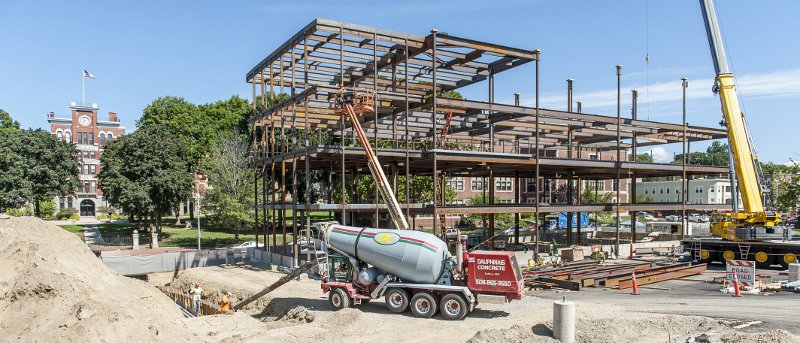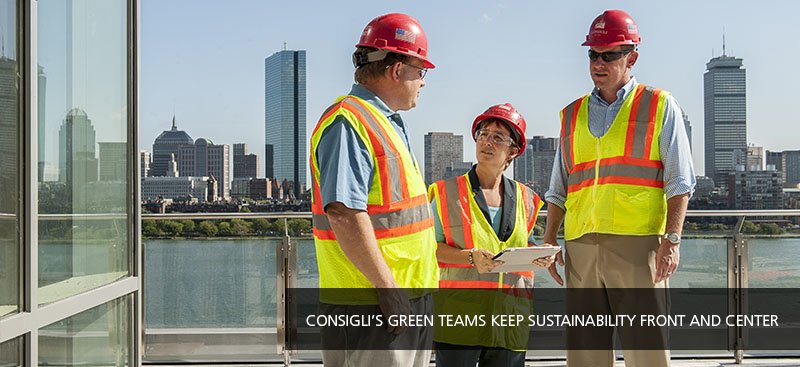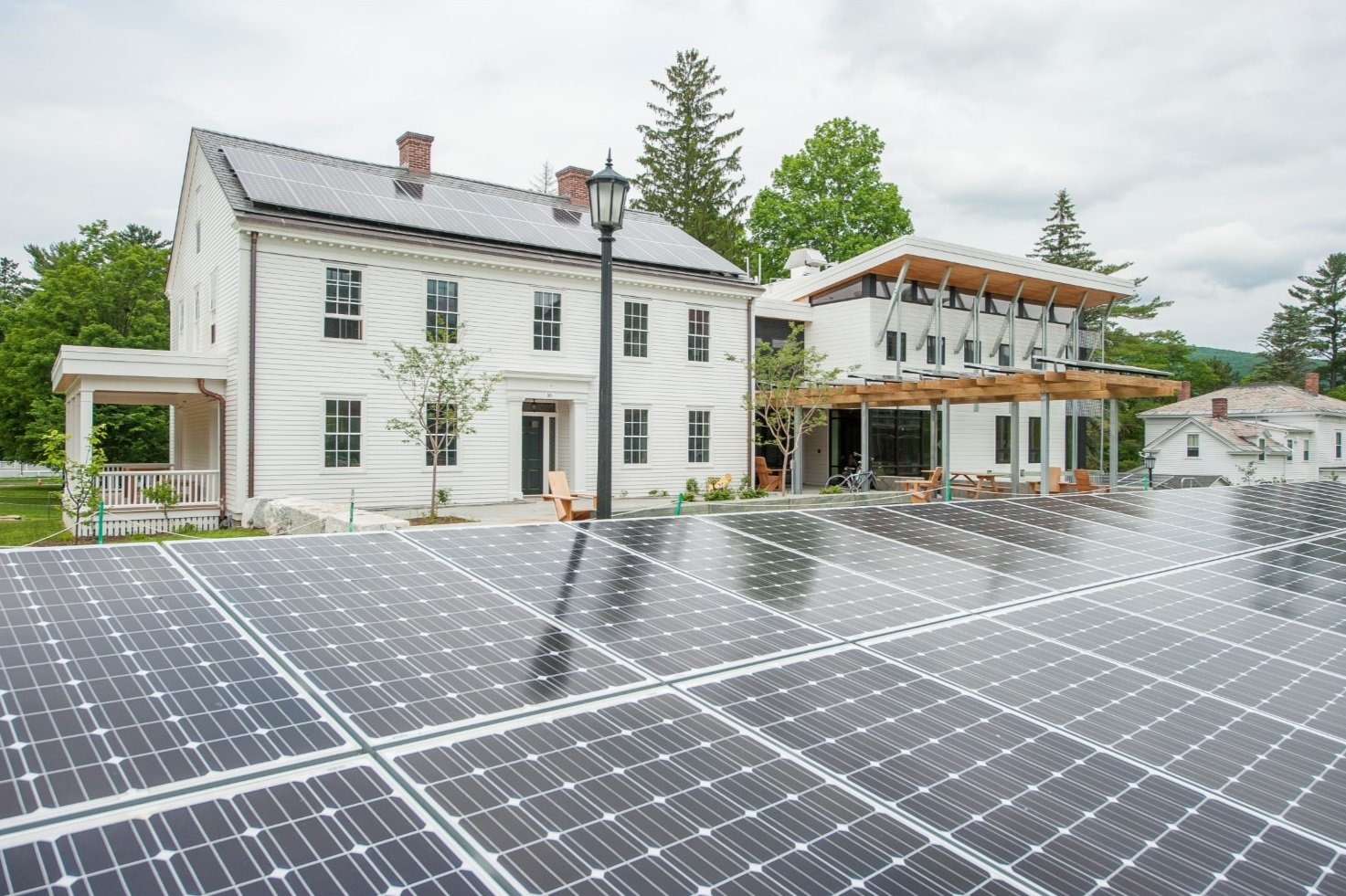BOSTON, MA – Highly efficient, sustainable buildings are always Consigli’s concern—whether a project formally pursues a green building certification program, or not.
The benefits of our “green builder” thinking comes in many shapes and sizes. From our pre-construction planning for Clark University’s first targeted net-zero-energy building, to managing the ultra-rigorous building material requirements for Williams College’s “Living Building Challenge” project—Consigli’s sustained commitment to sustainable construction continues to yield valuable environmental, financial and building-user benefits.
“It’s just part of our service.”
This is how Consigli’s Kathleen MacEwen, LEED AP BD+C, Sustainability Coordinator, sums up both her unique industry role. It is also a good summary of Consigli’s overall approach to sustainability. Responsible for keeping Consigli’s LEED-track projects on track since the early years of green building, Kathleen’s role is not typically found in-house at construction management firms. Also responsible for making sure the firm’s 75 LEED-accredited-professionals’ training is up-to-the-minute, Kathleen’s focus is just part of the story of how Consigli, almost two decades since the launch of the USGBC’s LEED program, continues to earn its reputation as a top “Green Builder,” year after year.
Green Thinking, Front and Center
The larger story of Consigli’s early and sustained expertise in green construction is seen in many ways—from our construction of one of New England’s first LEED-Platinum projects, Harvard University’s Blackstone Office Building, from the firm’s study for the Massachusetts Department of Environmental Protection (DEP) on the efficiency and value of source separation that the agency used as a model for other companies, and in the company’s role on the Massachusetts’ Zero Net Energy Buildings Task Force, providing recommendations for the state’s report “Getting to Zero.” And the company has long chosen renewable energy for its own needs, with the Milford, Massachusetts’ headquarters powered entirely with renewable energy purchased from a local, solar power vendor, as well as with solar panels atop the office.
The firm’s deep commitment to environmentally sound construction is reflected in distinctive staff roles. Sustainability Coordinator, Kathleen MacEwen, LEED AP BD+C, and M/E/P Manager, Ed Dubois, LEED AP, are among key staffers who keep sustainability in the forefront on Consigli’s projects.
“As a firm, we were one of the front-runners on the LEED program and pursued initiatives like efficient waste management processes early on, even before LEED,” says Dubois.
“The pre-construction phase is my favorite part of a project—it’s when we have the best opportunity to have an impact on a project. From how energy efficient a building is, to identifying cost savings for our clients,” says Dubois. Dubois, another of Consigli’s many LEED Accredited Professionals, is a member of the firm’s Project Services Group, with expertise in both geothermal and solar energy systems.
One of Dubois’ many charges during a recent project’s two-year pre-construction phase was assisting a client team to analyze Building Management System (BMS) options, to assure their building, once its renovation is complete, maintains the optimal energy efficiency of its new mechanical, electrical, plumbing and heating systems, through their on-going monitoring and fine-tuned adjustment. Dubois reviewed the BMS options from a variety of vendors in great detail, ultimately helping to identify the best system for the owner’s needs, at a significant cost savings. The chosen system will monitor the building’s new M/E/P systems, from lighting to heating, fine tuning temperature and illumination in response to the building’s use, day to day, moment to moment.
The firm’s management of the LEED process also begins early for each project. MacEwen explains, “We partner in the beginning to make the project go smoothly, the schedule stay on track and the relationship with the client really work.” She embraces the whole team accountability of LEED and the Integrated Process (IP) credit. “We also often recommend ‘submittal summits’ for complex systems and assemblies, where all the stakeholders come together, including the architect, to review everything, minimize misunderstandings and provide a better quality installation. This process is also an essential part of our Lean management practices. Our Lean practices inherently support our sustainable construction in many valuable ways.”
Collaborating Toward a Net-Zero-Energy Vision:
Clark University’s New Student and Alumni Engagement Center

The new Student and Alumni Engagement Center, across the street from Clark’s main campus, is the latest, and largest, project Consigli has undertaken for this Worcester, Massachusetts university—well known for its inclusion on Princeton Review’s “Green Colleges” list. The project, underway this past spring, is a candidate for LEED Platinum certification. It is another example of how Consigli’s early involvement, begun during project design, contributes toward a project’s vision. In this case, a vision toward net-zero-energy use.
The 35,000-gross-square-foot, four-story new center at Clark is heralded as a “Gateway Project,” because with it, the campus extends across Main Street for the first time, providing an anchor and catalyst for new economic development within the city.
The project’s most ambitious environmental goal involves solar power generation, which the college hopes will eventually lead to its net-zero-energy output. To achieve this, Consigli is building the university’s first solar canopy atop the new building. This cantilevered canopy will host a 140kW photovoltaic array, the company’s largest solar installation to date.
Consigli’s collaboration with the project architect, Boston-based Architerra Inc.—recognized as one of the leading sustainable architecture and planning firms in the Northeast—is a valuable aspect of the firm’s pre-construction work for the University. During pre-construction Consigli’s team reviewed the early design and provided the design team with key contacts and advice about the triple-glazed curtainwall—which is fundamental to the building’s sustainable design and function.
In the equation of how to build for net-zero-energy use, enclosing a building tightly is a key first step. When designed and built well, the right curtainwall system significantly reduces a building’s energy use, often lowering consumption by as much as 70%.
On the road to building sustainably, project managers also need to be vigilant about product and materials transparency and waste management. For Clark, the team’s vigilance on product and materials transparency involves verifying and documenting that building materials have recycled content, are manufactured and extracted with 500 miles and avoid product ingredients that emit volatile organic compounds—which are often identified by odor producing off-gassing.
“We aren’t just building the project, we are the guardians of the gate on materials verification,” said Rich Scopelliti, LEED AP, Consigli Project Manager. This involves everything from using as much recycled materials as possible to avoiding millwork fabricated using urea formaldehyde resins.
Clark’s Chief Investment Officer, Jim Collins, inspired the design team by telling them, “Go further, be bolder.” Ellen Watts, LEED AP, President of Architerra, explained “The alumni center at Clark is a project for the future with energy goals that will actually exceed platinum status.”
Watts also noted that the Clark project was the recipient of a “Leading by Example” grant award from the state’s Executive Office of Energy and the Environment for its renewable energy standards. “Clark, Consigli, and the Commonwealth are indeed leading by example by showing that sustainability and renewable energy are not just nice ideas, they are the way of the future and will be imperatives in growing our institutions and our economy,” said Watts. “Projects like this one say to the world, ‘See? We can do this.”
Kathleen MacEwen, LEED AP BD+C, is another important part of Consigli’s team, shepherding the project through the LEED process in support of Clark’s goal for a LEED Platinum-certified building. Consigli digs in early, which MacEwen feels is the best way to ensure success.
It is here that the goals of sustainable building benefit from Consigli’s collaborative, pre-construction planning ability. “Our goal is to exceed expectations whenever we can. It’s our early involvement during pre-construction that also allows us to assist the design team with research and identification of the materials and systems we’ll be installing and documenting for LEED during construction. If we can say, ‘The client was going for Silver and we were able to steer it to Gold,’ we take a lot of pride in that.” MacEwen said.
Green, Greener, Greenest:
Williams College’s Environmental Center Takes on the Living Building Challenge
When Williams College decided to create a campus Environmental Center, it decided to take on the Living Building Challenge (LBC)—the most rigorous of sustainable building benchmark programs in the world today. Building the 6,800-square-foot center, the new home of the college’s Center for Environmental Studies and the Zilkha Center for Environmental Initiatives—required a rigorous and pioneering effort from Consigli’s team, too.
Part reuse of the campus’ historic Kellogg House, built in 1794, and part new construction, to say the project was aspirational, is an understatement. So far there are only seven buildings worldwide that have met the challenge, and the Environmental Center is among the first 25 to be registered in the program. If all goes well, it will likely also be the first historic renovation in the U.S. to meet the Living Building Challenge. Now that construction is complete, the LBC program requires the building maintain net-zero energy and water use and ecosystem regeneration, over a minimum of 12 months of continuous occupancy, for it to become qualified.
“In the LEED process, you can be judged on energy model success based on a computer simulation. With the LBC, they look at your energy bills,” said Charley Stevenson, LEED AP BD+C, of Integrated Eco Strategies, who advised the team on the transformation of the 18th century Kellogg House into the new Class of 1966 Environmental Center. Opened in the spring of 2015, it is now well into its first year of monitored energy use and regeneration. The center’s sustainable systems include fixed photovoltaic panels on the roof, as well as others placed on the ground that track the sun to maximize the ability to gather energy. Water collected from the roof filters into a 6,000-gallon cistern buried underground, is heated by UV light and run back into the building. The LBC also includes agricultural requirements which the project incorporates with its student-run vegetable garden, as well as an apple orchard and berry and herb gardens.
Also inherent to an LBC project: they can only use water that arrives on the site naturally, is treated on the site, and returned to the natural cycle. All food waste has to be composted on-site (including workers’ lunches) and a strict waste management process must separate and recycle construction waste on site.
The LBC made Kellogg House’s transformation into the new Environmental Center among the most ambitious green building projects in the world. It also gave Consigli’s construction management team a set of imperatives—with no instruction manual.
LBC projects require that all energy used to operate a building must be produced on site, from a renewable source, and without combustion. Equally important to LBC projects is the adherence to its guidelines for building materials and products. None of the materials and products used in an LBC project can contain any form of the 13 materials LBC includes on its “Red List,” including some chemicals found in fairly common current building materials, such as polyvinyl chloride (PVC), used in PVC piping.
Consigli’s team noted the unique opportunity this project offered, with the focus on where and how building materials are manufactured, to support LBC goals of eliminating the use of toxic materials, and reducing the distance materials travel. To address the LBC’s core challenge of using only approved materials, the team dedicated a lot to researching materials, including understanding an item’s chemical make-up and where its closest manufacturer was.
The radius restrictions added to this challenge. As one team member explained, “It is one thing to find stone and concrete produced within the allowable zone (500 miles), but another to identify materials like steel so close to home.” If it is simply not possible to find certain materials, even after exhaustive research, LBC requires the team document the effort made.
A big part of finding the right materials consistent with LBC’s environmental goals, was the Consigli team’s constant communication with the design team, the team’s environmental consultant, manufacturers and subcontractors. Together they held many mini-conferences to figure out how to get the product information they needed, or how to identify vendors who could comply with the LBC criteria.
The collaboration has paid off. Though the LBC distinction is not awarded until after the twelve month occupancy period, through which the college must prove it has met its efficiency goals, the Environmental Center at Williams College is already a model of regeneration and sustainability. It will also be a laboratory for optimizing energy use, applying transparency, and pushing the limits of a new era of building that will change the market and—hopefully the world—forever.


